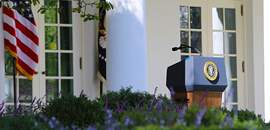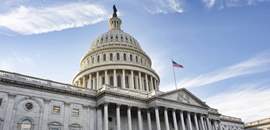Just when it appeared there was little hope Congress would provide much-needed relief for COVID-19, Republicans and Democrats reached agreement on a $900 billion bill this week.
The stalemate was broken when a bipartisan group in the Senate led by Senators Joe Manchin, D-W.Va, Mark Warner, D-Va, Bill Cassidy, R.-La, and Mitt Romney, R.-Utah among others introduced a $908 billion proposal on December 1. Previously, a major stumbling block was Democrats were seeking a package in excess of $2 trillion while Republicans would only consider a bill of $1 trillion or less.
The bill that was ultimately enacted contains key provisions of the initial package with some modifications. Specifically, it allocates $340 billion in support to households, $331 billion for small businesses including added support for the Paycheck Protection Program (PPP) of $284 billion, and additional funding of $82 billion for education and $52 billion for public health.
The bill passed with overwhelming support in both the House of Representatives and the Senate, and President Trump reportedly will sign it.
This begs the question: How was Congress able to craft a plan after months of wrangling over the issue?
My take is several factors coalesced to enhance the prospects for a deal.
First, the surge in COVID-19 cases, hospitalizations and deaths in the past month leaves little doubt that the worst of the pandemic will be felt in the next few months. The resurgence in COVID-19 already has resulted in a clampdown of businesses in several states, and the pace of jobs creation slowed markedly in November. While the unemployment rate edged down to 6.7% from 6.9%, it mainly reflected 400,000 people withdrawing from the labor force.
Second, the situation could have become much worse for 12 million jobless workers if the Pandemic Unemployment Assistance (PUA) and the Pandemic Emergency Unemployment Compensation (PEUC) are allowed to lapse after Christmas. The PUA program covers about 7.4 million contractors, self-employed and gig workers, while the PEUC program provides an added 13 weeks of benefits to jobless workers once their state benefits lapse.
A key feature of the bill is the inclusion of a $300 weekly supplement for unemployed workers until mid-March. While this is one half of the $600 weekly supplement contained in the CARES Act that Democrats sought, it represents a concession from Republicans who did not favor any added benefits because they believed it discouraged laid-off workers from seeking employment.
The bill also includes additional relief in the form of $600 per person for eligible individuals (and dependents) that was not included in the original proposal. It represents a compromise on both sides, as Democrats sought provisions of $1,200 per taxpayer and $500 for dependents while Republicans did not want to include any additional assistance. Democrats were willing to hold off on this for the time being to gain assistance for those in greatest need. However, President-elect Biden has indicated the package “at best, is only going to be a down payment.”
Another priority is assistance to small and medium size businesses such as restaurants, hotels, and transport that have warned of mass layoffs and dire consequences if federal support is not forthcoming. While the PPP program was intended to deal with this issue, one critique is that one quarter of the funds that were provided went to the top 1% of applicants. To redress this, businesses applying for PPP henceforth will be targeted to those with fewer than 300 employees that experienced significant revenue declines.
A major sticking point in the negotiations was assistance to states and municipalities. The second version of the HEROES Act drafted by Democrats pared back the tally for state and local aid for coronavirus to $436 billion from more than $1 trillion in the first version. However, the bill that was enacted does not provide any direct aid to state and local governments, although it includes support via funding for education, public transit and airports and for public health. For their part, Republicans were resistant to provide state and local government aid, but they sought liability protections for businesses, universities and other institutions that were not included in the bill.
One surprise development was a provision sponsored by Sen Toomey, R-PA, to prevent the U.S. Treasury from restarting Federal Reserve credit facilities that Republicans believe were intended to sunset at the end of this year. The amendment is not intended to inhibit the Fed’s longstanding authority in other areas.
Finally, the question remains whether passage of the bill signifies that a new spirit of compromise is possible or is merely a one-off extension of the CARES Act.
My conclusion is it is too early to tell. A lot is riding on the two Senate elections in Georgia on January 5.
Should Republicans keep control of the Senate, the Biden administration will be hard pressed to get through its ambitious fiscal plan that calls for significant increases in government spending funded by tax increases. However, if the Democrats gain control, President Biden and House Speaker Pelosi are likely to press for increased government spending to bolster the economy.
That said, a breakthrough on the Congressional stalemate is encouraging in one respect. Namely, it shows both parties can still reach a compromise when failure to do so spells disaster for those directly impacted by the worst public health crisis in 100 years.
A version of this article was posted to TheHill.com on December 8, 2020.



















